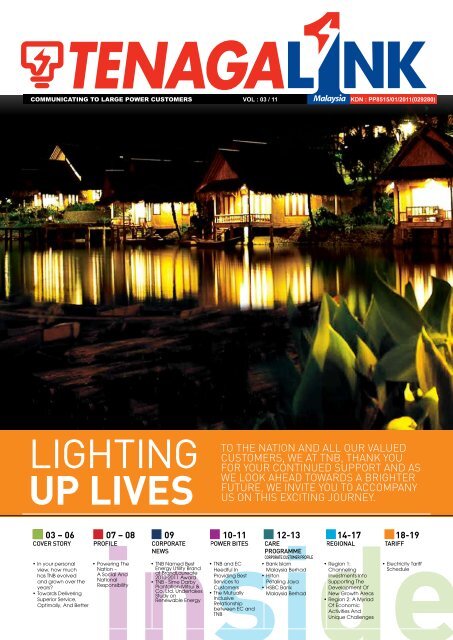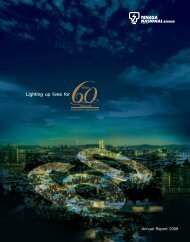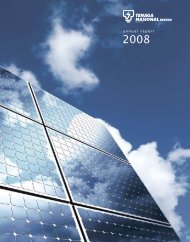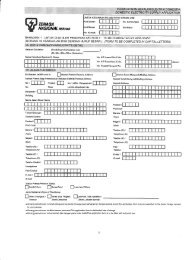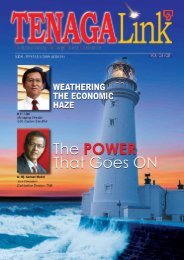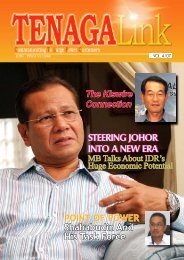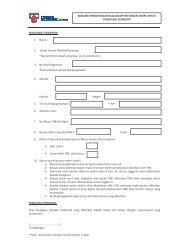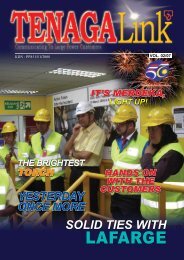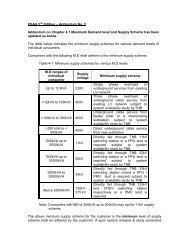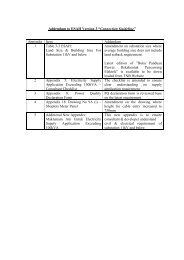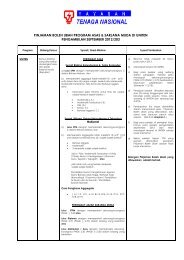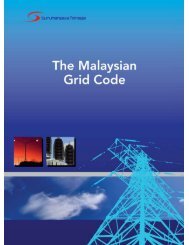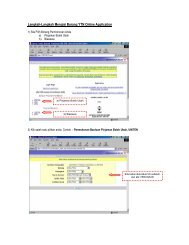LIGHTING UP LIVES - Tenaga Nasional Berhad
LIGHTING UP LIVES - Tenaga Nasional Berhad
LIGHTING UP LIVES - Tenaga Nasional Berhad
Create successful ePaper yourself
Turn your PDF publications into a flip-book with our unique Google optimized e-Paper software.
COMMUNICATING TO LARGE POWER CUSTOMERS<br />
VOL : 03 / 11<br />
L NKDN<br />
K<br />
: PP8515/01/2011(029280)<br />
<strong>LIGHTING</strong><br />
<strong>UP</strong> <strong>LIVES</strong><br />
to the nation and all our valued<br />
customers, we at tnb, thank you<br />
for your continued support and as<br />
we look ahead towards a brighter<br />
future, we invite you to accompany<br />
us on this exciting journey.<br />
03 – 06<br />
COVER STORY<br />
• In your personal<br />
view, how much<br />
has TNB evolved<br />
and grown over the<br />
years<br />
• Towards Delivering<br />
Superior Service,<br />
Optimally, And Better<br />
07 – 08<br />
PROFILE<br />
• Powering The<br />
Nation –<br />
A Social And<br />
National<br />
Responsibility<br />
09<br />
CORPORATE<br />
NEWS<br />
• TNB Named Best<br />
Energy Utility Brand<br />
at BrandLaureate<br />
2010-2011 Award<br />
• TNB - Sime Darby<br />
Plantation-Mitsui &<br />
Co. Ltd. Undertakes<br />
Study on<br />
Renewable Energy<br />
10-11 12-13 14-17 18-19<br />
POWER BITES<br />
• TNB and EC<br />
Heedful In<br />
Providing Best<br />
Services to<br />
Customers<br />
• The Mutually<br />
Inclusive<br />
Relationship<br />
between EC and<br />
TNB<br />
CARE<br />
PROGRAMME<br />
CORPORATE CUSTOMER PROFILE<br />
• Bank Islam<br />
Malaysia <strong>Berhad</strong><br />
• Hilton<br />
Petaling Jaya<br />
• HSBC Bank<br />
Malaysia <strong>Berhad</strong><br />
REGIONAL<br />
• Region 1:<br />
Channeling<br />
Investments Into<br />
Supporting The<br />
Development Of<br />
New Growth Areas<br />
• Region 2: A Myriad<br />
Of Economic<br />
Activities And<br />
Unique Challenges<br />
TARIFF<br />
• Electricity Tariff<br />
Schedule
Editor’s<br />
2<br />
Note<br />
"At <strong>Tenaga</strong> <strong>Nasional</strong> <strong>Berhad</strong><br />
(TNB), we’ve made a long-term<br />
commitment to light up lives."<br />
It is a commitment that is shared by each<br />
and every employee at the company and<br />
we embrace this responsibility very<br />
seriously.<br />
Everyday, millions entrust us to provide<br />
them with affordable, reliable, efficient<br />
and uninterrupted access to electricity.<br />
As a responsible utility company, TNB<br />
continually seek ways on how we can<br />
further enhance our services.<br />
From powering the nation’s administrative<br />
strengths to lighting up households and<br />
empowering all sectors of the economy,<br />
we at TNB are honored that we are able<br />
to make a very significant contribution<br />
towards nation building.<br />
Drawing on more than 60 years of<br />
experience, knowledge, technical<br />
expertise and a wealth of resources, we<br />
pride ourselves with the fact that<br />
electricity is today supplied to more than<br />
99% of the nation. The remaining 1% of<br />
course constitutes new developments<br />
and growth areas that are awaiting<br />
connectivity.<br />
Over the years, TNB has successfully<br />
overcome and continues to face a myriad<br />
of challenges. The single most influential<br />
driving force within the company has of<br />
course been the social responsibility we<br />
have in ensuring that every Malaysian is<br />
entitled and is able to enjoy the benefits<br />
of electricity.<br />
Moving forward, TNB envision ourselves<br />
playing a bigger role in nation building<br />
and we are now aggressively exploring,<br />
investing and pursuing new technologies<br />
which include greater focus on renewable<br />
sources of energy for a more sustainable<br />
future.<br />
To all our customers and the nation, we<br />
thank you for your continued support and<br />
as we look ahead towards a brighter<br />
future, we invite you to accompany us on<br />
this exciting journey. ■<br />
ADVISOR<br />
• Hj. Hussin Othman<br />
EDITOR<br />
• Hjh. Nazariah Ibrahim<br />
Assistant EDITORS<br />
• Nik Najihah Nik Ahmad • Zahirah Long<br />
Editorial ADVISORS<br />
• Dato' Roslan Ab Rahman<br />
• Syed Hidzam Osman<br />
CONTRIBUTORS<br />
• Tariff & Special Projects Unit,<br />
CSM Department<br />
• Offices of Operations - Region 1 &<br />
Operations - Region 2<br />
• Rosidah Abdul Manan<br />
• Geraldine Linda<br />
• TNB Corporate<br />
Communications Department<br />
Letters to the Editor<br />
We welcome comments regarding the<br />
contents of <strong>Tenaga</strong> Link. Letters must<br />
include your name, address and contact<br />
number. All letters to the Editor should be<br />
addressed to:<br />
<strong>Tenaga</strong> Link<br />
Senior Manager (Public Relations & Media),<br />
Distribution Division, Level 17, Wisma TNB,<br />
No. 19, Jalan Timur, 46200 Petaling Jaya<br />
Selangor Darul Ehsan or email to<br />
najihah@tnb.com.my / zahirahl@tnb.com.my<br />
TENAGA LINK, the newsletter (KDN: PP8515/1/2012)(029280) is produced for <strong>Tenaga</strong> <strong>Nasional</strong> <strong>Berhad</strong> (386965-A), 129, Jalan Bangsar, 59200 Kuala Lumpur, by CD Advertising Sdn. Bhd. (135508-A),<br />
3-2, Jalan PJU 8/3A, Damansara Perdana, 47820 Petaling Jaya, Selangor Darul Ehsan and printed by Art Printing Works Sdn. Bhd. (9406-D), 29 Jalan Riong, 59100 Kuala Lumpur, Malaysia. All rights reserved.<br />
No part of this publication may be produced or stored in a retrieval system, or transmitted in any from or any means, electronic, mechanical, photocopying, recording or otherwise, without the prior written permission<br />
of TNB Distribution Division.
3<br />
COVER STORY<br />
In your personal view,<br />
how much has TNB evolved and<br />
grown over the years<br />
TNB is 62 this year. It has been six decades of transitions and transformations that saw<br />
the company growing and maturing from a pre-Independence colonial utility unit to a<br />
well-respected blue chip company it is today. At the crux of the company’s mission is its<br />
commitment to excellence, which has seen TNB striving continuously to improve and<br />
enhance the quality of its products and services as the primary public utility responsible<br />
for electricity supply in the country and in its role as an important catalyst for the<br />
country’s growth and development.<br />
The challenges that confront TNB over the years have been varied and many. However,<br />
we have taken tremendous strides and made significant moves in ensuring a sustainable<br />
future for the company by enhancing our operational, business and service excellence<br />
and by focusing our efforts on ensuring a secure, reliable and cost-effective electricity<br />
supply for the country. This is in line with the Government’s policy to promote a more<br />
efficient allocation and usage of energy resources and ensure the success of the<br />
country’s green policy.<br />
TNB’s strength and sustainability is based on the foundation, infrastructure and technical<br />
expertise and specialists it has built and moulded over the years. In going forward, TNB<br />
has charted a strategic plan that would further spur its growth, green agenda and global<br />
presence. ■<br />
Tan Sri Leo Moggie<br />
Chairman<br />
TNB<br />
Over the last five years we have worked at changing the behaviour of our<br />
staff to become more customer-centric. We have also improved our call<br />
centres and the way our Pusat Khidmat Pelanggan (Customer Service<br />
Centres) handles customers. I am proud that these efforts are beginning to<br />
show results. In 2007, our TNB CareLine 15454 won the gold award for best<br />
contact centre in Malaysia.<br />
Our top priority is to respond to customers quickly when they complain of<br />
breakdowns. We must ensure the customer is happy and continues to<br />
support us. I always remind our staff that without our customers we will not<br />
be where we are today. ■<br />
Dato’ Sri Che Khalib bin Mohamad Noh<br />
President/CEO<br />
TNB
4<br />
COVER STORY<br />
Towards Delivering<br />
Superior Service, Optimally<br />
And Better<br />
As an electrical engineer, Dato’ Ir. Azman bin Mohd, <strong>Tenaga</strong><br />
<strong>Nasional</strong> <strong>Berhad</strong>’s Executive Director and Chief Operating Officer,<br />
was faced with choice of enlisting in the navy, the air force or<br />
joining the National Electricity Board then known as LLN upon<br />
graduating in the early eighties.<br />
On the advice of his brother who was a mechanical engineer, he<br />
subsequently joined as an assistant manager based in LLN<br />
Mentakab.<br />
“Looking back at this experience, even 30 years ago LLN had<br />
already established a reputation of being the best place for an<br />
electrical engineer. It was also a place where one is able to<br />
contribute to the nation. I have served the company for 30 years<br />
now and I believe we have successfully maintained this reputation<br />
and standing, perhaps enhancing a bit further now that we have<br />
evolved to assume a greater commercial role as <strong>Tenaga</strong> <strong>Nasional</strong><br />
<strong>Berhad</strong>,” said Dato’ Ir. Azman.<br />
Dato’ Ir. Azman Bin Mohd<br />
Executive Director / Chief Operating Officer<br />
TNB<br />
“Not only have we managed to maintain a high employer rating but<br />
we have also made major in roads financially. We have been quite<br />
successful in managing the electricity business in this context and<br />
our wish and desire is to continue to uphold and enhance the<br />
reputation of this organisation.”<br />
What is notable is that over the years, he has also seen level of productivity at TNB increase tremendously. While the number of<br />
employees at TNB today are similar to what it was back in the early eighties, the load demand TNB handles today has more than<br />
doubled to its current demand of 15,000MW.<br />
Today, in terms of generation, transmission and distribution, TNB has also evolved to become a world class utility company and<br />
corporate organisation.<br />
In terms of electricity interruptions or unplanned outages for example, the industry average recorded by TNB in 2010 was at 75<br />
minutes, and this places Malaysia ahead of some of other Asian countries, as well as being on par with the performance of some<br />
European countries like the United Kingdom.<br />
Today, in terms of generation, transmission<br />
and distribution, TNB has also evolved to<br />
become a world class utility company and<br />
corporate organisation.
5<br />
COVER STORY<br />
"It is a company that has help<br />
others in many ways. A lot has<br />
changed in terms of payment<br />
methods for consumers."<br />
"Their after sales service is<br />
very prompt. I can access the<br />
internet for the entire family."<br />
As TNB continues to push forward, the emphasis Dato’ Ir. Azman<br />
said was now on ensuring that electricity supply not only remains<br />
reliable and its production and delivery becoming even more<br />
efficient, but in pursuing advanced technologies towards returning<br />
greater value to both the organisation and customers.<br />
Implementation of a Smart Grid System<br />
As a utility company TNB is continually looking and adopting the<br />
most optimal solution to generate, transmit and distribute<br />
electricity. The company has over the years made significant<br />
investments in new technologies designed to become more cost<br />
effective and to enhance its services and levels of efficiency and<br />
one such area being actively pursued is what is known as the<br />
Smart Grid system.<br />
“There are so many definitions of Smart Grid, one of which is,<br />
the use of communications and modern computing to upgrade<br />
the existing power grid so that it can extend more services and<br />
value to consumers and at the same time reduce Carbon<br />
Dioxide emissions”.<br />
“What it essentially provides<br />
for is that instead of just<br />
receiving, the Smart Grid<br />
system can allow consumers<br />
to make certain responsible<br />
decisions in terms of electricity<br />
usage and in doing so, they<br />
are able to save money.<br />
This in turn results in<br />
TNB using less energy<br />
and reducing its carbon<br />
footprint in terms of<br />
generating electricity.”<br />
Dato’ Ir. Azman said some elements of<br />
what is today recognised as the Smart Grid System have long<br />
been built into TNB’s grid, citing examples such as distribution<br />
automation and automatic switching capabilities which is able to<br />
identify and isolate the location of a fault without human<br />
intervention.<br />
“What it (Smart Grid) essentially offers, is the same level of<br />
reliability but at a reduced cost. You can have extreme reliability<br />
by having several back-ups in the conventional system but you<br />
can also have smart grid reliability by avoiding redundancies.<br />
This helps to reduce the cost of operations and assets.”<br />
What is of paramount importance he added, was the fact that the<br />
Smart Grid system increases the level of interactivity with<br />
customers, providing customers with information on how much it<br />
is costing them to operate certain equipment thus enabling them<br />
to make certain considerations and decisions on ways to enhance<br />
their operations.<br />
“Customer participation is giving the customer enough information<br />
to enable them to regulate their way of consumption, for example<br />
in providing them with advanced metering infrastructure, they<br />
can precisely know what it would cost them to use a particular<br />
equipment during peak and off-peak hours thus influencing how<br />
they use electricity.”<br />
TNB has already embarked on three pilot projects to evaluate<br />
the workings of a Smart Grid system for three different clusters:<br />
financial, industrial and commercial, located in Medini in<br />
Iskandar Malaysia, Johor, Bayan Lepas in Penang, and Bukit<br />
Bintang in Kuala Lumpur respectively.<br />
“These pilot projects will enable us to learn how to effectively<br />
implement the Smart Grid system across the country for<br />
different types of customers.”<br />
Dato’ Ir. Azman said the company subsidiary, TNB Research,<br />
has also been charged with looking into Smart Grid and other<br />
advanced technologies and to provide a road map for its<br />
introduction and applications to meet with tomorrow’s<br />
requirements.<br />
“At this stage, the world is still pioneering Smart Grid technology<br />
and as a user, it may not pay to be the early bird as far as<br />
Smart Grid technology is concerned due to the numerous<br />
technologies being introduced. Once you commit, you may find<br />
yourself in a situation where<br />
a newer and more advanced<br />
technology introduced. On<br />
that score, there is also no<br />
one solution that fits all.<br />
What is optimal in our pilot<br />
project in Bukit Bintang for<br />
example, may not be optimal<br />
for use in Bayan Lepas<br />
and therefore there must<br />
be enough research<br />
i n t o t h e e m e r g i n g<br />
technologies in Smart<br />
Grid and this is where TNB<br />
Research is currently playing the lead<br />
role".<br />
“We are going to be cautious in implementing Smart Grid as it<br />
is still very expensive, compounded by the fact that the<br />
technology is still evolving and emerging and has not yet<br />
matured".<br />
“Success of any Smart Grid technology of course, will be<br />
dependant on the reliability, technical performance level and at<br />
what cost compared to the conventional way of getting things<br />
done. The present or conventional technology is quite<br />
conservative, where performance and reliability is dependant<br />
on cost. The challenge of Smart Grid is therefore to deliver the<br />
same performance with just a fraction of the cost.”<br />
Another Smart Grid application being looked into as Dato’ Ir.<br />
Azman pointed out, was how electricity generated from<br />
renewable energy power plants, often susceptible to intermittent<br />
supply, can be effectively and efficiently integrated into the<br />
national grid to provide reliable and uninterrupted electricity to<br />
consumers.
6<br />
COVER STORY<br />
Greater efficiency in asset<br />
management<br />
In generating, transmitting and distributing<br />
electricity, TNB by nature is also rich with<br />
assets.<br />
“It’s a very asset-intensive industry where<br />
our asset today is estimated to be worth<br />
about RM75 billion. Today’s utility<br />
companies' challenge is how they can or<br />
employ a more productive use of their<br />
assets and TNB is now embarking very<br />
seriously on this initiative,” said Dato’ Ir.<br />
Azman.<br />
A new standard that is gathering<br />
momentum today and evolving into an<br />
ISO standard in terms of asset<br />
management is known as PAS 55,<br />
pioneered by the British Standards<br />
Institution and the Institute of Asset<br />
Management in the United Kingdom. This<br />
standard comprises the best practices of<br />
asset management gathered from all<br />
over the world.<br />
By definition, PAS 55 provides guidance<br />
for any organisations seeking to<br />
demonstrate a high level of professionalism<br />
in whole life cycle management of their<br />
physical assets. It is today typically<br />
relevant to the gas, electricity and water<br />
utilities, road, air and rail transport<br />
systems, public facilities, process,<br />
manufacturing and natural resource<br />
industries.<br />
This emerging standard closely scrutinizes<br />
the optimal management of physical<br />
asset systems and their life cycles to<br />
achieve best net, sustained value-formoney<br />
in the selection, design/ acquisition,<br />
operations, maintenance and renewal/<br />
disposal of physical infrastructure and<br />
equipment.<br />
“If in the past different divisions with an<br />
organisation looked at asset management<br />
in silos or independently, today we have<br />
to look at the whole cycle of planning the<br />
asset, constructing it, procuring it,<br />
operating it, maintaining it, and right to<br />
the point of replacing the asset. By<br />
studying the whole cycle chain you can<br />
actually provide greater alignment and<br />
consistency that translates into significant<br />
cost reduction".<br />
“The Smart Grid system is just one of<br />
several initiatives capable of reducing<br />
asset base to provide the same reliability<br />
standard and performance. We are not<br />
pursuing Smart Grid systems for the sake<br />
of it being an intelligent solution, but more<br />
importantly because it will help us to<br />
efficiently deploy our asset base.”<br />
Dato’ Ir. Azman said for companies like<br />
TNB, embracing PAS 55 is also working<br />
towards what will be an incentive-based<br />
regulatory framework in the future where<br />
savings and efficiency gains enjoyed by<br />
TNB can be shared and passed on to its<br />
customers.<br />
This steers clear of what is today a costplus<br />
framework, in which tariffs imposed<br />
are closely associated with the amount in<br />
capital expenditure invested.<br />
“What this essentially means is that utility<br />
companies like TNB and those in other<br />
countries will have to look very closely at<br />
their investment cost and investment<br />
strategy. We have to manage our assets<br />
more effectively and efficiently.”<br />
“TNB has already started to do this and I<br />
believe this will be the next best value<br />
creation for TNB over the next five years.<br />
Smart Grid is an important driver towards<br />
achieving this. What we are determined<br />
to achieve at the end of the day is to<br />
deliver superior service, optimally, and<br />
better.” ■<br />
Embracing PAS 55 is also working towards<br />
what will be an incentive-based regulatory<br />
framework in the future where savings<br />
and efficiency gains enjoyed by TNB can<br />
be shared and passed on to its customers.<br />
"Very efficient."
7<br />
PROFILE<br />
Powering The Nation –<br />
A Social And National<br />
Responsibility<br />
Haji Hussin Othman, the Vice President of<br />
<strong>Tenaga</strong> <strong>Nasional</strong> <strong>Berhad</strong>’s Distribution<br />
Division clearly remembered an incident<br />
when he first joined the company in 1982,<br />
where a 66-year-old lady had kept her<br />
house lights switched on for three<br />
consecutive days.<br />
“That was the first time her house that<br />
was located in a remote area received<br />
electricity and I remember her telling me<br />
that, that was the first time she had<br />
experienced such brightness at night…<br />
She wanted to experience it as long as<br />
she could, given her old age,” Hussin<br />
recalled.<br />
Today, more than 99% of Malaysia enjoys<br />
the benefits of electricity and what prevents<br />
TNB from attaining 100% record is rapid<br />
development that continues to create new<br />
residential and non-residential clusters.<br />
Entrusted with the care of 7.6 million<br />
customers, a figure that continues to grow<br />
annually, TNB’s Distribution Division plays<br />
a very important and significant role in not<br />
only powering the nation, but carries a<br />
huge social and national responsibility on<br />
its shoulders.<br />
“The role our Division plays is a very<br />
critical one in powering the nation. We<br />
must make sure that electricity supply is<br />
not only available to the most remote<br />
areas, but more importantly, that the<br />
supply quality, delivery and efficiency<br />
meets with desired global standards as<br />
Malaysia progresses towards becoming<br />
an industrialised nation,” said Hussin. As<br />
undoubtedly TNB’s biggest Division and<br />
also by virtue of being the single largest<br />
income earner contributing close to RM30<br />
billion per annum to TNB’s annual revenue,<br />
the Distribution Division’s task can be<br />
categorised into two primary areas –<br />
network service and customer service.<br />
“One of the most critical areas is to ensure that the delivery system and the availability<br />
of electricity supply subscribe to world standards and therefore at TNB, we benchmark<br />
our services to that of developed countries. We have already achieved this and<br />
internally, we are now aiming at superseding this and to become even better by<br />
2015.”<br />
In relation to network service, TNB’s Distribution Division allocates an average of RM3.5<br />
billion per year to capital expenditure, 60% of which is devoted to the implementation of<br />
new projects while the remaining 40% is channeled towards the upgrading of its system<br />
which includes replacement of cables, metering equipment and sub-stations. There are<br />
approximately 60,000 sub-stations throughout Peninsular Malaysia.<br />
“Moving ahead, we continue to look towards further enhancing not only our services,<br />
but the methodology of our work. This relates to embracing new technology to ensure<br />
that the operation of our electrical systems can be done more efficiently and better. By<br />
establishing two regional control centres for example, TNB today is able to ensure that<br />
the customer benefits from faster restoration in the event of a breakdown as we are able<br />
to quickly pin-point the source and deploy manpower more efficiently.”<br />
Another area being pursued is the wider installation of compact sub-stations, which is<br />
of significant benefit as it does not require large amounts of land, are easier to construct<br />
and commission.<br />
Already partially being implemented are also remote meter reading facilities which no<br />
longer require TNB to make physical visits to the premises of its customers. Remote<br />
meter reading is currently being used for Large Power Customers as the technology is<br />
not yet financially viable to be introduced to the masses to include households.
8<br />
PROFILE<br />
ENTRUSTED WITH THE<br />
CARE OF 7.6 MILLION<br />
CUSTOMERS, A FIGURE<br />
THAT CONTINUES TO<br />
GROW ANNUALLY, TNB’S<br />
DISTRIBUTION DIVISION<br />
PLAYS A VERY IMPORTANT<br />
AND SIGNIFICANT<br />
ROLE IN NOT ONLY<br />
POWERING THE NATION,<br />
BUT CARRIES A HUGE<br />
SOCIAL AND NATIONAL<br />
RESPONSIBILITY ON ITS<br />
SHOULDERS.<br />
Haji Hussin Othman<br />
Vice President (Distribution)<br />
TNB<br />
Customer service on the other hand, poses an even bigger<br />
challenge to overcome despite initiatives and enhancements<br />
being undertaken often appearing intangible or unseen by<br />
customers, covering a myriad of areas from handling new<br />
applications, service quality to billing requirements.<br />
One initiative currently being undertaken is to enhance the<br />
quality of service offered by TNB’s front line employees. In<br />
addition to already establishing a Call Management Centre<br />
(CMC), TNB is now embarking on putting in place One Stop<br />
Enquiry Centre or OSEC (1300-88-5454) in order to facilitate<br />
customers enquiries via telephone.<br />
With this facility, customers would no longer endure the<br />
inconveniences of going to the nearest TNB office to conduct<br />
their transactions and to make enquiries, instead, enquiries<br />
will just be a telephone call away. While these centres interact<br />
directly with end users, the existing CMC will be devoted to<br />
tackling enquiries related specifically to power disruptions and<br />
faulty street lights.<br />
“People first – this is TNB’s commitment to our customers and<br />
the nation,” Haji Hussin said.<br />
A Frost & Sullivan audit of TNB’s service level meanwhile, has<br />
awarded it 7.0 merit points (7.5 being the industry high) which<br />
places the company on par and in the group of 80% of the<br />
world’s top rated corporations.<br />
“There is still plenty of room for improvement but what we have<br />
achieved thus far is nevertheless something quite significant.<br />
The target now moving forward is to achieve the 7.5 mark in<br />
2015.”<br />
In his 29 years of service at TNB, Haji Hussin has seen TNB<br />
evolve aggressively into not only a progressive organisation but<br />
one that is customer-centric, as the company pursues the<br />
national agenda.<br />
“At TNB, we the employees are entrusted with the responsibility<br />
of providing a service to the people and country, there are not<br />
many companies in which one is able to do this, and this is also<br />
precisely what has motivated me to remain at TNB.” ■
9<br />
CORPORATE<br />
NEWS<br />
"The number of power<br />
breakdown is reducing. A lot of<br />
activities can be done now."<br />
TNB Named Best<br />
Energy Utility Brand<br />
at BrandLaureate<br />
2010-2011 Award<br />
<strong>Tenaga</strong> <strong>Nasional</strong> <strong>Berhad</strong> (TNB) has won the BrandLaureate 2010-2011 Award for the<br />
Best Energy Utility Brand - Corporate Branding Category.<br />
The Award was presented by Dr. KK Johan, the President of BrandLaureate in a grand<br />
ceremony that took place at the Shangri-La Hotel in Kuala Lumpur, in March 2011.<br />
TNB’s Chief Operating Officer Dato’ Ir. Azman Mohd received the award on behalf of the<br />
Company. Also present at the event was Bank Negara Govenor, Tan Sri Dr. Zeti Akhtar<br />
Aziz.<br />
The BrandLaureate Award is one of the branding awards recognised by His Majesty The<br />
Yang di-Pertuan Agong, Tuanku Mizan Zainal Abidin. The prestigious award was<br />
conferred in recognition of branding excellence among the best brand international<br />
standard companies, public listed companies and Government-Linked Companies as<br />
well as other outstanding corporations in the world. ■<br />
TNB - Sime Darby<br />
Plantation-Mitsui &<br />
Co. Ltd. Undertakes<br />
Study on Renewable<br />
Energy<br />
<strong>Tenaga</strong> <strong>Nasional</strong> <strong>Berhad</strong> (TNB) and Sime Darby Plantation, a subsidiary of Sime Darby<br />
<strong>Berhad</strong> has announced that it will collaborate with Mitsui & Co. Ltd. of Japan in conducting<br />
a study on the feasibility of generating electricity from factory effluent and oil palm empty<br />
fruit bunches in Malaysia.<br />
A signing ceremony was held in April 2011 at the Sime Darby Convention Centre in Kuala<br />
Lumpur to formalise the agreement.<br />
Dato' Ir. Azman Mohd, TNB’s Chief Operating Officer/Executive Director represented the<br />
company at the signing ceremony. Sime Darby Plantation was represented by its Executive<br />
Vice President, Frankie Antony Dass while Mr. Tory Ryoso, General Manager, Environment<br />
Business Division signed on behalf of Mitsui & Co. Ltd. Present to witness the event was<br />
Minister for the Embassy of Japan in Malaysia, Koichi Ito.<br />
Under the agreement, Sime Darby Plantation will select processing plants that produces<br />
Palm Oil Mill Effluent (POME) while Mitsui will design and provide technical expertise in<br />
trapping bio-gas. TNB on the other hand, is responsible for maintaining electricity<br />
connection operations to the national power grid. ■
10<br />
POWER<br />
BITES<br />
TNB and EC<br />
Heedful In Providing Best<br />
Services to Customers<br />
Dialogue sessions and discussions between the Energy<br />
Commission (EC) and TNB to discuss issues relating to service<br />
and electricity supply to consumers, bare testimony to the care<br />
and concern showed by both parties in resolving concerns faced<br />
by consumers.<br />
TNB Vice President (Distribution), Hj Hussin Othman said TNB<br />
takes every issue raised by customers very seriously and close<br />
cooperation and mutual understanding between TNB and the<br />
EC is necessary in handling issues relating to electricity supply<br />
and service to consumers.<br />
“Such dialogue sessions are also implemented at the state<br />
level, and we in TNB take every issue relating to customer<br />
service very seriously. We try our very best to satisfy the<br />
customers’ needs and strive to solve every complaint or problem<br />
raised” said Hj Hussin in his opening remarks to kick off a<br />
dialogue session with the EC (Headquarters level) recently at<br />
the EC Head Office at Putrajaya.<br />
Ir Fauzi said the spirit of understanding and<br />
mutual respect between the two parties is<br />
necessary to ensure that both EC and TNB can<br />
collectively provide the best to consumers.<br />
He explained that the EC and TNB could not<br />
afford to take issues and problems raised by<br />
consumers lightly. In fact, both parties should<br />
cooperate in charting strategies in an effort to<br />
handle issues raised as well as to address<br />
existing weaknesses in electricity supply and<br />
services to consumers.<br />
Among others, the dialogue session deliberated<br />
on issues of services to consumers and those<br />
related to electricity supply such the<br />
maintenance of risers at multi-storey buildings,<br />
bi-monthly meter reading, disconnection of<br />
electricity supply and theft of electricity.<br />
The dialogue session was attended by senior management<br />
teams of TNB Distribution Division and the EC. Among those<br />
present from TNB’s Distribution Division were Ir Hj Mustafa Din,<br />
Senior General Manager (Operations-Region 1), Ir Ismail Mohd<br />
Din, Senior General Manager (Asset Management), YM Tengku<br />
Haliza Tengku Muhammad, General Manager (Finance), Safwan<br />
Atan, General Manager (Human Resource Management &<br />
Administration Service), Noraini Shaarani, Assistant General<br />
Manager (Service Development and Marketing, Customer<br />
Service Department), Selimin Othman, Assistant General<br />
Manager (Commercial and Green Technology), and Rahim Md<br />
Din, Senior Manager (Reporting & Government/Industry<br />
Relations)<br />
Also discussed was the issue of feedback/<br />
complaints by consumers related to bi-monthly<br />
meter reading in the Customer Feedback<br />
System. Statistics has however, shown a drop<br />
in customer complaints pertaining to the<br />
issue.<br />
Upon conclusion of the Putrajaya dialogue,<br />
both parties expressed satisfaction with the<br />
discussions held and expressed the hope that<br />
the spirit of cooperation and understanding in<br />
handling issues raised would continue to<br />
prevail in the interest of consumers. ■<br />
The dialogue session was chaired by Ir Hj Md Fauzi Hasan, Chief<br />
Executive Officer of the EC. Among the EC senior management<br />
present were Ir Hj Azhar Omar, Senior Director (Electricity<br />
Supply), Shahrilnazim Shaari, Senior Legal Advisor, Ir Othman<br />
Omar, Director (Enforcement and Area Coordination), Hj Abd.<br />
Rahim Ibrahim, Director (Electricity Safety) and Head of State<br />
Areas.
11<br />
11<br />
CARE<br />
PROGRAMME<br />
The Mutually<br />
Inclusive<br />
Relationship<br />
Between EC and<br />
TNB<br />
“The relationship<br />
between the EC and<br />
TNB is akin to a single<br />
entity which requires<br />
mutual cooperation and<br />
assistance,” Dato’ Roslan<br />
Ab Rahman.<br />
A dialogue session was also held with the Perak EC chaired<br />
by Dato’ Roslan Ab Rahman, Senior General Manager<br />
(Operations-Region 2), Distribution Division TNB.<br />
Dato’ Roslan said operational issues raised are solved in the<br />
course of the day to day operations and that this could only<br />
be implemented with the existing communication network.<br />
Implementation also needs to take into account the welfare<br />
and comfort of consumers which now stands at 7.6 million<br />
as well as those of the investors, stakeholders and the<br />
Government.<br />
“The relationship between the EC and TNB is akin to a single<br />
entity which requires mutual cooperation and assistance”,<br />
Dato’ Roslan added.<br />
Hj Nur Ali Za bin Omar, EC Area Head of the Perak State as<br />
joint chairman of the dialogue session in his speech, recorded<br />
EC’s appreciation to TNB for taking the initiative in organising<br />
the dialogue. He hoped such meetings would form a platform<br />
for officers at TNB and the EC to interact as well as improve<br />
mutual relationships. He clarified that EC plays the role of<br />
ensuring electricity safety for consumers as well as that of<br />
TNB employees in the course of doing their work.<br />
Also present from TNB at the dialogue, were Dato’ Mohd Zahir<br />
Md Nagor, State General Manager (Perak), Ir. Ramli Abdullah,<br />
State Chief Engineer (Perak); Haji Abdul Aziz Abd Majid, Chief<br />
Engineer (Operation, Region 2); Hjh. Nazariah Ibrahim, General<br />
Manager (Customer Service & Marketing), Noraini Shaarani,<br />
Assistant General Manager (Service Development & Marketing);<br />
Hj Amir Mahmod Abdullah, Head (Revenue Enhancement). The<br />
EC on the other hand was represented by Hj Shahidan Bahaman<br />
(Head of Investigation & Enforcement), Mohd Nawawi Said<br />
Abdullah (Electricity Supply); Mariatinawati Yusuf (Legal<br />
Advisor, EC Perak) and other state EC officials.<br />
The dialogue session followed with a visit to the Sultan Azlan<br />
Shah Power Station in Manjung. TNB and EC representatives<br />
were welcomed by Ir. Hj Azman Talib, the Chief Operating<br />
Officer of the Sultan Azlan Shah Power Station.<br />
In his closing remarks, Dato’ Roslan said the challenge faced<br />
by both EC and TNB is to meet the increasing expectation of<br />
consumers. Hence both organisations need to play the role of<br />
providing the best service to customers.<br />
“I wish to record our appreciation to the cooperation given by<br />
the EC to TNB Perak in particular and TNB in general”. ■
12<br />
CARE<br />
PROGRAMME<br />
CORPORATE<br />
CUSTOMER<br />
PROFILE<br />
Bank Islam<br />
Malaysia <strong>Berhad</strong><br />
Bank Islam Malaysia <strong>Berhad</strong><br />
was established in 1983 as the<br />
nation’s first Islamic bank. To<br />
date, the Bank has a network<br />
of more than 100 branches<br />
and 900 self-service terminals<br />
nationwide.<br />
Dato' Sri Zukri Samat<br />
Managing Director<br />
Today, Bank Islam has become the symbol of Islamic banking in<br />
Malaysia and together with its vision of becoming “The Global<br />
Leader in Islamic Banking”, projects its status as the flag bearer<br />
of the country’s Islamic financial services industry.<br />
To meet the diversity of the public’s financial needs, Bank Islam<br />
offers a comprehensive list of more than 50 innovative Shari’ahbased<br />
banking products and services which cater to Muslims and<br />
non-Muslims, and comparable to those offered by its conventional<br />
counterparts.<br />
From the traditional financing, savings and investment types of<br />
products exclusively for individual customers, the range of Bank<br />
Islam’s Shari’ah-based financial products, services and business<br />
solutions has significantly expanded to cater to the fast-changing<br />
financial needs of customers from all categories including those<br />
related to micro financing, wealth management, capital market,<br />
treasury and structured products.<br />
In recognition of its pioneering role, Bank<br />
Islam was awarded the Reader’s Digest<br />
Platinum Award for being the Most Trusted<br />
Brand for Islamic Financial Services for two<br />
consecutive years. With the entrusted belief,<br />
Bank Islam is on its way in becoming “The<br />
Global Leader in Islamic Banking” and<br />
continues to remain guided by the excellent<br />
pioneering work by its predecessors,<br />
Malaysia’s ambition to be the international<br />
Islamic financial hub, the success of its<br />
turnaround efforts and the challenge from<br />
its competitors.<br />
For more information on Bank Islam products<br />
and services, visit www.bankislam.com.my<br />
or call Bank Islam Call Center at 03-2690 0900. ■<br />
From only RM80 million initially, Bank Islam’s paid-up capital<br />
swelled to RM1.73 billion as at June 2009, which was instrumental<br />
in making possible the growth of its assets and the implementation<br />
of its expansion programmes.
Chris Ehmann<br />
General Manager<br />
Hilton<br />
Petaling Jaya<br />
The 553-room Hilton Petaling Jaya is located on Jalan Barat and<br />
is right in the heart of Petaling Jaya in Selangor. Known to most<br />
as just PJ, Petaling Jaya is a self-contained city and commercial<br />
hub with many modern shopping complexes, recreational<br />
facilities and entertainment centres. It is just 15 minutes away<br />
from the capital city of Kuala Lumpur and approximately 45<br />
minutes away from the Kuala Lumpur International Airport<br />
(KLIA) in Sepang.<br />
The Hilton Petaling Jaya, opened in 1984, is Hilton’s second hotel<br />
in Malaysia. The hotel is owned by Tradewinds Hotels & Resorts<br />
Sdn. Bhd., a subsidiary of Tradewinds Corporation <strong>Berhad</strong>, one<br />
of the largest hotel owners in the country with 11 hotels in its<br />
stable.<br />
Explore the melting pot of cuisine that the hotel’s four restaurants<br />
and bar have to offer. At the Paya Serai Restaurant, guests are<br />
guaranteed the best local and Malay cuisine from its sumptuous<br />
buffet spread. For fine oriental cuisine lovers, the Toh Yuen<br />
Chinese Restaurant serves modern Cantonese cuisine while the<br />
Genji Japanese Restaurant is known for its traditional delights<br />
from the land of the rising sun. Uncle Chilli’s meanwhile, plays<br />
host to a resident band which belts out music and songs ranging<br />
from Hip Hop, R & B to the new era of Rap and Rock & Roll.<br />
At the Hilton Petaling Jaya, our guest rooms and suites are<br />
appointed with light, fresh décor, high speed Internet access, a<br />
writing desk and chair, mini bar, in-room safe, tea/coffee making<br />
facility, dual telephone lines with direct dial facility and television<br />
with in-house movies and channels to keep guests informed with<br />
the latest news and entertained.<br />
Mukhtar Hussain<br />
Deputy Chairman & Chief<br />
Executice Officer<br />
HSBC Bank<br />
Malaysia <strong>Berhad</strong><br />
HSBC's presence in Malaysia dates back to 1884 when the<br />
Hongkong and Shanghai Banking Corporation Limited<br />
established its first office in the country, on the island of<br />
Penang, with privileges to issue currency notes.<br />
HSBC Bank Malaysia <strong>Berhad</strong> is a wholly-owned subsidiary of<br />
the HSBC Group. HSBC Holdings plc, the parent company of the<br />
HSBC Group, is headquartered in London. The Group serves<br />
customers worldwide from around 8,000 offices in 88 countries<br />
and territories in Europe, the Asia-Pacific region, the Americas,<br />
the Middle East and Africa. With assets of US$2,364 billion at 31<br />
December 2009, HSBC is one of the world’s largest banking and<br />
financial services organisations. HSBC is marketed worldwide<br />
as ‘the world’s local bank’.<br />
Leveraging on a wide global network, HSBC Bank Malaysia<br />
offers an extensive range of products and services for both<br />
personal and corporate customers, which have won awards and<br />
accolades from customers and independent parties alike.<br />
Services provided include personal financial services,<br />
commercial banking, global banking and markets and offshore<br />
banking.<br />
Islamic banking products and services for both retail and<br />
corporate customers are offered by HSBC Bank Malaysia’s<br />
subsidiary, HSBC Amanah Malaysia <strong>Berhad</strong>, a full-fledged<br />
locally incorporated Islamic bank. Takaful (Islamic insurance)<br />
products, developed by HSBC Amanah Takaful (Malaysia) Sdn<br />
Bhd, are also distributed by both HSBC Bank Malaysia and<br />
HSBC Amanah Malaysia. ■<br />
For business travellers, Hilton Petaling Jaya also offers 21<br />
function rooms and the Kristal Ballroom with its pre-function<br />
foyer that are available for small business meetings and<br />
conferences accommodating from 10 to 1000 persons.<br />
For more information, kindly contact the Hilton Petaling Jaya at<br />
tel no: 03-7955 9122, fax no: 03-7955 3909, or visit our website<br />
at www.hilton.com. ■
14<br />
REGIONAL<br />
"They light up our lives and service<br />
has improved a lot in terms of<br />
supply. Nothing can move without<br />
electricity supply."<br />
"Good services but electricity<br />
rate is high (tariff). Nothing’s<br />
changed. Still the same<br />
TNB from 20 years back."<br />
REGION 1: CHANNELING<br />
INVESTMENTS INTO S<strong>UP</strong>PORTING<br />
THE DEVELOPMENT OF NEW<br />
GROWTH AREAS<br />
In 2010, customers in Kuala Lumpur,<br />
Putrajaya, Selangor, Negeri Sembilan,<br />
Melaka and Johor contributed 66 % to<br />
<strong>Tenaga</strong> <strong>Nasional</strong> <strong>Berhad</strong>’s total annual<br />
sales of RM28 billion. Consumption of<br />
electricity in the state of Selangor alone,<br />
contributed a staggering of RM7.5<br />
billion.<br />
Home to one of the most densely<br />
populated and the nation’s most affluent<br />
communities, Region 1 which groups four<br />
states and the Federal Territories of<br />
Kuala Lumpur and Putrajaya, presents<br />
TNB with a unique set of challenges.<br />
“Perhaps our biggest challenge is to<br />
upkeep and upgrade our infrastructure to<br />
ensure we are able to offer the highest<br />
quality service and reliability to our<br />
customers. TNB continues to invest<br />
heavily to ensure the best supply possible<br />
to all our customers,” said Ir. Mustafa<br />
Din, TNB’s Distribution Division Senior<br />
General Manager (Operations – Region<br />
1).<br />
“The Klang Valley is the biggest<br />
concentration area for TNB, involving<br />
Kuala Lumpur, Selangor and Putrajaya<br />
which are also home to a large affluent<br />
population. They therefore, demand the<br />
best from us (TNB) and we have to ensure<br />
that we deliver the best service possible<br />
to these customers. The Klang Valley<br />
also forms the bulk of our prime<br />
customers in the country and here sits all<br />
the important installations, from<br />
Government offices, foreign commissions,<br />
international service and data centre,<br />
industrial, commercial and financial<br />
districts.”<br />
In terms of the number of customers,<br />
Region 1 has the highest number of<br />
customers between TNB’s two regions in<br />
Peninsular Malaysia, accounting for 58.4<br />
% of TNB’s 7.6 million customers.<br />
Selangor again tops the list accounting<br />
for 35% of customers, ahead of Johor<br />
and Kuala Lumpur.<br />
The largest contributor to TNB’s annual<br />
revenue within Region 1 is made up of<br />
the commercial sector which constitutes<br />
43% while industrial consumption of<br />
electricity brings in 38% of TNB’s sales.<br />
And while the remaining 17% in sales is<br />
contributed by domestic customers or<br />
households, this group happens to<br />
account for the most number of customers<br />
in Region 1 at 82%.<br />
In recent years Ir. Mustafa said, "there is<br />
an emerging trend in the development of<br />
integrated commercial complexes<br />
designed to cater to the various needs of<br />
the people were being undertaken on a<br />
larger scale as compared to facilities<br />
Ir. Mustafa Din<br />
Senior General Manager (Operations-Region 1)<br />
Distribution Division<br />
TNB
15<br />
REGIONAL<br />
Region 1 which<br />
comprises customers<br />
in Kuala Lumpur,<br />
Putrajaya, Selangor,<br />
Negeri Sembilan,<br />
Melaka and Johor<br />
contributed 66.7%<br />
to <strong>Tenaga</strong> <strong>Nasional</strong><br />
<strong>Berhad</strong>’s total annual<br />
sales of RM28 billion<br />
in 2010.<br />
built in the past. These developments are<br />
being constructed in the existing<br />
developed areas to tap on the potential of<br />
existing consumer population. Cables<br />
installation work poses the biggest<br />
challenge on the already crowded<br />
corridor. Redevelopment of inner KL is a<br />
case in point where we have to work<br />
closely with the Developers and the<br />
Authorities to ensure that cables can be<br />
laid and stable electricity supply can be<br />
made available".<br />
“The ongoing challenge we face is to<br />
continuously communicate to all stakeholders<br />
and the public that world class<br />
electricity infrastructure is the<br />
responsibility of everyone and not just<br />
TNB alone. Duty of care should be<br />
paramount when working close to existing<br />
TNB infrastructure, be it in underground<br />
and over-head system to ensure they are<br />
not encroached upon. Although we are<br />
now equal to some European countries in<br />
terms of supply reliability, our aim<br />
ultimately, is to be amongst the best in<br />
the world," said Ir. Mustafa.<br />
Besides Klang Valley, Iskandar Malaysia<br />
in Johor is being developed into a new<br />
major growth area. Ir. Mustafa said, “It<br />
has become TNB’s duty to ensure that it<br />
is able to meet with the required needs<br />
and demands of all new and existing<br />
growth centre on a timely manner.<br />
Iskandar Malaysia project covers a vast<br />
area from Pasir Gudang to Kulai and<br />
what makes the undertaking even more<br />
challenging is the fact that the current<br />
distribution voltages used in the area is<br />
different to that in other parts of Malaysia.<br />
While other regions in Malaysia currently<br />
subscribe to 11kV and 33kV as main<br />
distribution voltages, the current voltage<br />
in Iskandar Malaysia is using 22kV and<br />
6.6kV."<br />
Other initiatives currently in place, include<br />
the upgrading and rehabilitation of some<br />
of TNB’s older sub-stations in Kuala<br />
Lumpur, Selangor and Johor in order to<br />
be able to accommodate a higher capacity<br />
demand. In Selangor for instance, a total<br />
of 27 main distribution stations are to be<br />
upgraded over a five-year period.<br />
Also in the pipeline, are projects designed<br />
to support the Government’s initiative in<br />
establishing the Greater KL project which<br />
include the Mass Rapid Transit (MRT)<br />
project. TNB is well geared to support all<br />
these initiatives.<br />
On energy efficiency Ir. Mustafa said,<br />
“TNB is always promoting the efficient<br />
use of electricity in the light of the<br />
diminishing fossil energy resources in<br />
the country and in the world which lead<br />
to the increase in fuel price in electricity<br />
generation. TNB is promoting customers<br />
to manage their electricity consumption<br />
to be as efficient as possible. The term<br />
used is “Demand Side Management”,<br />
which involves reducing electricity use<br />
through activities or programs that<br />
promote energy efficiency or electricity<br />
co n s e r vation, o r m o re e f f i c i e n t<br />
management of electricity supply loads.<br />
These efforts include promoting high<br />
efficiency building practices, promote the<br />
purchase of energy-efficient products,<br />
encourage customers to shift to non<br />
–critical usage of electricity from highuse<br />
periods to after 7 p.m or before 10<br />
a.m, organising of programs providing<br />
limited utility control of customer<br />
equipment such as air conditioners, and<br />
promote energy awareness and education.<br />
For high voltage customers they can opt<br />
for ‘peak and off peak tariff’, where they<br />
can move their peak usage from day to<br />
night usage and also use energy thermal<br />
storage devices to lower their day time<br />
use”. It is always wise to be as efficient<br />
as possible when using electricity.<br />
On Finance, Ir. Mustafa mentioned that<br />
TNB is pursuing to enhance its collection<br />
and cash flow, working hard to curtail<br />
non-technical losses within the system<br />
often caused by irresponsible parties.<br />
Reducing pilferages will ultimately boost<br />
TNB’s bottom line.<br />
On customer service, Ir. Mustafa<br />
mentioned that TNB is continuously<br />
improving our service counters and the<br />
Call Management Centre(CMC). TNB has<br />
also introduced the One Stop Enquiry<br />
Centre or OSEC (1-800-88-5454) in order<br />
to facilitate customer’s inquiries via<br />
telephone. Customers can also use TNB<br />
Web Services for most transactions<br />
i n c l u d i n g s u p p l y a p p l i c a t i o n<br />
(e-Application), billing enquiries<br />
(e-Services), lodge complaints and<br />
suggestion and even make payments<br />
online.
16<br />
REGIONAL<br />
REGION 2: A MYRIAD OF<br />
ECONOMIC ACTIVITIES AND<br />
UNIQUE CHALLENGES<br />
From Perak to Perlis, and Pahang to Kelantan, <strong>Tenaga</strong> <strong>Nasional</strong><br />
<strong>Berhad</strong>’s Region 2 provides the setting for one of the most<br />
challenging tasks of powering the nation due to the vast land mass<br />
it covers and the myriad of economic activities it serves.<br />
In a region where economic activity is so diverse - catering to high<br />
demand customers in the commercial, industrial and tourism<br />
industries - a very important pre-requisite for TNB to fulfill is to<br />
ensure electricity supply is stable as interruptions will significantly<br />
affect the businesses of its customers.<br />
What also distinguishes Region 2 is the fact that the land mass<br />
overlooks poses a variety of challenges when it comes to connectivity,<br />
covering not only lowlands, but highlands and islands.<br />
Dato’ Roslan Ab Rahman<br />
Senior General Manager (Operations-Region 2)<br />
Distribution Division<br />
TNB<br />
“The most critical task in our Region is to ensure electricity stability<br />
and reliability to all our customers, both residential and nonresidential,<br />
in both places of importance and interest,” said Dato’<br />
Roslan Ab Rahman, TNB’s Distribution Division Senior General<br />
Manager (Operations-Region 2).<br />
“As a facilitator of growth and economic<br />
development, TNB’s role has become<br />
e v e n i n c re a s i n g ly i m p o r t a n t i n<br />
supporting the national agenda.”<br />
In Perak for instance, the supply of<br />
electricity sees TNB playing an<br />
important role in developing the<br />
horticulture industry where commercial<br />
raring of prawns and fish is being<br />
a g g r e s s i v e l y p r o m o t e d b y t h e<br />
Government. Cameron Highlands is<br />
the centre of Malaysia’s vegetable and flower industry, where more and more<br />
commercial planters today have traded conventional ways to rely on high-tech<br />
and sophisticated methods in farming to enjoy a better yield of crops.<br />
“Agro-farming today has become very dependant on electricity where industries<br />
are resorting to the use of artificial heat and air-conditioning as a means of<br />
controlling temperature stability,” Dato’ Roslan said.<br />
Up North, Penang is the Region's biggest customer in terms of demand for<br />
electricity which caters to the large manufacturing sector, driven mainly by<br />
electrical and electronics cluster.<br />
“In Penang, the industries are what we classify as high-end customers. They<br />
consume a large volume of electricity as their industries are dependant on it,”<br />
Dato’ Roslan said.<br />
Demand for electricity continues to grow very rapidly he added, and with the<br />
future opening of the Second Penang Bridge, is expected to create plenty of spinoffs<br />
in new growth areas on the island as well as the mainland, in which TNB is<br />
now looking into facilitating. Further North in Kedah meanwhile, electricity and<br />
the quality of its supply caters to not only a large industrial cluster but also hightech<br />
facilities.
17<br />
REGIONAL<br />
To the east coast of Peninsular<br />
Malaysia, the industrial area of Gebeng<br />
in Pahang for instance, requires TNB<br />
t o a c c o m m o d a t e t o t h e s t r i c t<br />
requirements of a very large cluster of<br />
petrochemical and polymer industries.<br />
Pekan meanwhile, houses a large<br />
automotive cluster and plans are<br />
currently underway to transform it into<br />
a hub for automobile assembly in the<br />
country. In Terengganu, TNB also plays<br />
a very significant role in ensuring that<br />
supply to the nation’s largest gas<br />
processing facility goes uninterrupted.<br />
Coincidentally, TNB’s own power plants<br />
are dependant on the supply of gas<br />
from these facilities.<br />
“The sensitivity and the needs of each<br />
of these clusters in terms of electricity<br />
supply are very unique.”<br />
One of the most challenging tasks<br />
Region 2 is faced with, according to<br />
Dato’ Roslan, particularly in the<br />
eastern part of the peninsular,<br />
concerns getting electricity supply to<br />
the sparse communities located in<br />
remote or isolated areas. At times, the<br />
location to be “powered up” may be 50<br />
to 60km from the nearest connection<br />
point available on the national grid.<br />
Ongoing projects to address this for<br />
example include collaborating with the<br />
M i n i stry o f R e g i o n a l a n d R u ral<br />
D e v e l o p m e n t ( M R R D ) f o r t h e<br />
construction and commissioning of<br />
solar hybrid systems in remote areas<br />
for small villages and for the Orang<br />
Asli community.<br />
The same system is also being installed<br />
to power communities living on islands<br />
off the coast of Terengganu and<br />
Pahang. Successful examples of hybrid<br />
systems already in use are in Pulau<br />
Perhentian in which electricity is<br />
generated by the use of solar, wind<br />
and diesel power and Pulau Tioman<br />
which relies on diesel and mini hydro.<br />
Electricity supply to the island of<br />
Langkawi meanwhile, is carried from<br />
the national grid on the mainland via<br />
underwater cable.<br />
While ensuring that electricity supply<br />
to the islands for example, is a national<br />
and social obligation, it is also part of<br />
an even bigger agenda that is in line<br />
with promoting tourism in the country<br />
as sufficient and stable supply will<br />
promote the development of better<br />
infrastructure and facilities such as<br />
resorts and hotels.<br />
In bringing electricity to the desired<br />
l o c a t i o n s , t h e t w o b i g g e s t<br />
considerations TNB is confronted with<br />
are cost and distance. Connection to<br />
the national grid must weigh financial<br />
viability against the best possible<br />
technical solutions. At times, a location<br />
is simply too remote and involves a<br />
great distance that it would not be<br />
financially feasible to extend supply<br />
from the main grid. In such cases, a<br />
hybrid or standalone system would be<br />
deemed the most appropriate and<br />
financially viable.<br />
“Irrespective of the challenges and<br />
costs involved, our role is to light up<br />
lives and this is our commitment to the<br />
rakyat.”<br />
Dato’ Roslan said TNB also actively<br />
engages in regular community outreach<br />
programmes where TNB<br />
representatives sit together with<br />
Test drive - Dato' Roslan testing a<br />
new vehicle for the breakdown<br />
team in Kuantan.<br />
Irrespective of the<br />
challenges and<br />
costs involved, our<br />
role is to light up<br />
lives and this is our<br />
commitment to the<br />
rakyat.<br />
various levels of community leaders<br />
and other local authorities, to engage<br />
customers, gather valuable feedback<br />
and resolve concerns quickly.<br />
“Whether you are dealing with a single<br />
factory that provides you with revenue<br />
amounting to RM3 million per month<br />
or 20,000 customers that provide you<br />
with the same income, we at TNB still<br />
provide the same level of service and<br />
attention and our philosophy at Region<br />
2 is that we will light you up whether it<br />
is a single home, a village, commercial<br />
entity located in the lowlands, highlands<br />
or islands.” ■
18<br />
Tariff<br />
ELECTRICITY TARIFF SCHEDULE<br />
(This tariff is effective from 1st June 2011 and supersedes the previous tariff schedule which was effective on 1st March 2009)<br />
Schedule 1<br />
TNB tariff rates are set out as follows:-<br />
Tariff Category Unit New Rates<br />
1. Tariff A – Domestic Tariff<br />
For the first 200kWh (1–200kWh) per month sen/kWh 21.8<br />
For the next 100kWh (201–300kWh) per month sen/kWh 33.4<br />
For the next 100kWh (301–400kWh) per month sen/kWh 40.0<br />
For the next 100kWh (401–500kWh) per month sen/kWh 40.2<br />
For the next 100kWh (501–600kWh) per month sen/kWh 41.6<br />
For the next 100kWh (601–700kWh) per month sen/kWh 42.6<br />
For the next 100kWh (701–800kWh) per month sen/kWh 43.7<br />
For the next 100kWh (801–900kWh) per month sen/kWh 45.3<br />
For the next kWh (901kWh onwards) per month sen/kWh 45.4<br />
The minimum monthly charge is RM3.00<br />
2. Tariff B - Low Voltage Commercial Tariff<br />
For overall monthly consumption between 0–200kWh per month:<br />
For all kWh sen/kWh 39.3<br />
The minimum monthly charge is RM7.20<br />
For overall monthly consumption more than 200kWh per month:<br />
For all kWh (from 1kWh and above) sen/kWh 43.0<br />
The minimum monthly charge is RM7.20<br />
3. Tariff C1 – Medium Voltage General Commercial Tariff<br />
For each kilowatt of maximum demand per month RM/kW 25.90<br />
For all kWh sen/kWh 31.2<br />
The minimum monthly charge is RM600.00<br />
4. Tariff C2 – Medium Voltage Peak/Off-Peak Commercial Tariff<br />
For each kilowatt of maximum demand per month during the peak period RM/kW 38.60<br />
For all kWh during the peak period sen/kWh 31.2<br />
For all kWh during the off-peak period sen/kWh 19.2<br />
The minimum monthly charge is RM600.00<br />
5. Tariff D – Low Voltage Industrial Tariff<br />
For overall monthly consumption between 0–200kWh per month:<br />
For all kWh sen/kWh 34.5<br />
The minimum monthly charge is RM7.20<br />
For overall monthly consumption more than 200kWh per month:<br />
For all kWh (from 1kWh and above) sen/kWh 37.7<br />
The minimum monthly charge is RM7.20<br />
Tariff Ds – Special Industrial Tariff (for consumers who qualify only)<br />
For all kWh sen/kWh 35.9<br />
The minimum monthly charge is RM7.20<br />
6. Tariff E1 – Medium Voltage General Industrial Tariff<br />
For each kilowatt of maximum demand per month RM/kW 25.30<br />
For all kWh sen/kWh 28.8<br />
The minimum monthly charge is RM600.00<br />
Tariff E1s – Special Industrial Tariff (for consumers who qualify only)<br />
For each kilowatt of maximum demand per month RM/kW 19.90<br />
For all kWh sen/kWh 28.3<br />
The minimum monthly charge is RM600.00<br />
7. Tariff E2 – Medium Voltage Peak/Off-Peak Industrial Tariff<br />
For each kilowatt of maximum demand per month during the peak period RM/kW 31.70<br />
For all kWh during the peak period sen/kWh 30.4<br />
For all kWh during the off-peak period sen/kWh 18.7<br />
The minimum monthly charge is RM600.00
Tariff Category Unit New Rates<br />
Tariff E2s – Special Industrial Tariff (for consumers who qualify only)<br />
For each kilowatt of maximum demand per month during the peak period RM/kW 27.70<br />
For all kWh during the peak period sen/kWh 28.3<br />
For all kWh during the off–peak period sen/kWh 16.1<br />
The minimum monthly charge is RM600.00<br />
8. Tariff E3 – High Voltage Peak/Off–Peak Industrial Tariff<br />
For each kilowatt of maximum demand per month during the peak period RM/kW 30.40<br />
For all kWh during the peak period sen/kWh 28.8<br />
For all kWh during the off-peak period sen/kWh 17.3<br />
The minimum monthly charge is RM600.00<br />
Tariff E3s – Special Industrial Tariff (for consumers who qualify only)<br />
For each kilowatt of maximum demand per month during the peak period RM/kW 24.40<br />
For all kWh during the peak period sen/kWh 26.7<br />
For all kWh during the off-peak period sen/kWh 14.7<br />
The minimum monthly charge is RM600.00<br />
9. Tariff F – Low Voltage Mining Tariff<br />
For all kWh sen/kWh 32.6<br />
The minimum monthly charge is RM120.00<br />
10. Tariff F1 – Medium Voltage General Mining Tariff<br />
For each kilowatt of maximum demand per month RM/kW 18.10<br />
For all kWh sen/kWh 26.8<br />
The minimum monthly charge is RM120.00<br />
11. Tariff F2 – Medium Voltage Peak/Off-Peak Mining Tariff<br />
For each kilowatt of maximum demand per month during the peak period RM/kW 25.50<br />
For all kWh during the peak period sen/kWh 26.8<br />
For all kWh during the off-peak period sen/kWh 14.7<br />
The minimum monthly charge is RM120.00<br />
12. Tariff G – Street Lighting Tariff<br />
For all kWh (including maintenance) sen/kWh 26.1<br />
For all kWh (excluding maintenance) sen/kWh 16.4<br />
The minimum monthly charge is RM7.20<br />
13. Tariff G1 – Neon & Floodlight Tariff<br />
For all kWh sen/kWh 17.8<br />
The minimum monthly charge is RM7.20<br />
14. Tariff H – Low Voltage Specific Agriculture Tariff<br />
For overall monthly consumption between 0–200kWh per month:<br />
For all kWh sen/kWh 36.9<br />
The minimum monthly charge is RM7.20<br />
For overall monthly consumption more than 200kWh per month:<br />
For all kWh (from 1kWh and above) sen/kWh 40.3<br />
The minimum monthly charge is RM7.20<br />
15. Tariff H1 – Medium Voltage General Specific Agriculture Tariff<br />
For each kilowatt of maximum demand per month RM/kW 25.90<br />
For all kWh sen/kWh 30.0<br />
The minimum monthly charge is RM600.00<br />
16. Tariff H2 – Medium Voltage Peak/Off-Peak Specific Agriculture Tariff<br />
For each kilowatt of maximum demand per month during the peak period RM/kW 34.90<br />
For all kWh during the peak period sen/kWh 31.2<br />
For all kWh during the off-peak period sen/kWh 19.2<br />
The minimum monthly charge is RM600.00<br />
Notes:<br />
1% as Feed–in–Tariff (FiT) for RE Fund will be imposed on consumers' monthly bill (excluding Domestic consumers with monthly consumption of<br />
300kWh and below) effective from 1st December 2011.


